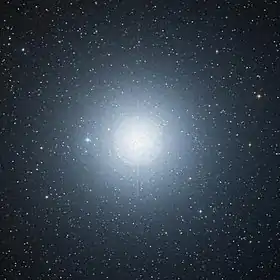| Observation data Epoch Equinox | |
|---|---|
| Constellation | Canis Minor |
| Right ascension | +07h 40m 06.9950s[1] |
| Declination | +05° 13′ 52.243″[1] |
| Apparent magnitude (V) | 6.02[2] (6.33 + 6.96)[3] |
| Characteristics | |
| Spectral type | A0IV + A0IV[4] |
| Astrometry | |
| A | |
| Radial velocity (Rv) | 17[2] km/s |
| Proper motion (μ) | RA: −2.026[1] mas/yr Dec.: −18.518[1] mas/yr |
| Parallax (π) | 4.8912 ± 0.1480 mas[1] |
| Distance | 670 ± 20 ly (204 ± 6 pc) |
| Orbit[5] | |
| Period (P) | 1,516 yr |
| Semi-major axis (a) | 2.792″ |
| Eccentricity (e) | 0.917 |
| Inclination (i) | 67.3° |
| Details | |
| A | |
| Radius | 5.9[6] R☉ |
| Luminosity | 72[6] L☉ |
| Surface gravity (log g) | 4.08[7] cgs |
| Temperature | 9,517[7] K |
| Other designations | |
| Database references | |
| SIMBAD | data |
| A | |
| B | |
HD 61563 is a star in the constellation of Canis Minor. It is an optical binary with Procyon and a white giant crossing the Hertzsprung gap, however it is not actually gravitationally related to it. This is a double star system, but its components have not been individually resolved. The combined spectral type is A0III, and the combined apparent magnitude is 6.02, barely visible to the naked eye.
References
- 1 2 3 4 5 Vallenari, A.; et al. (Gaia collaboration) (2023). "Gaia Data Release 3. Summary of the content and survey properties". Astronomy and Astrophysics. 674: A1. arXiv:2208.00211. Bibcode:2023A&A...674A...1G. doi:10.1051/0004-6361/202243940. S2CID 244398875. Gaia DR3 record for this source at VizieR.
- 1 2 Hoffleit, D.; Warren, W. H. (1995). "VizieR Online Data Catalog: Bright Star Catalogue, 5th Revised Ed. (Hoffleit+, 1991)". VizieR On-line Data Catalog: V/50. Originally Published in: 1964BS....C......0H. 5050. Bibcode:1995yCat.5050....0H.
- ↑ Kharchenko, N. V. (2001). "All-sky compiled catalogue of 2.5 million stars". Kinematika I Fizika Nebesnykh Tel. 17 (5): 409. Bibcode:2001KFNT...17..409K.
- ↑ Abt, Helmut A.; Morrell, Nidia I. (1995). "The Relation between Rotational Velocities and Spectral Peculiarities among A-Type Stars". Astrophysical Journal Supplement. 99: 135. Bibcode:1995ApJS...99..135A. doi:10.1086/192182.
- ↑ Izmailov, I. S. (2019). "The Orbits of 451 Wide Visual Double Stars". Astronomy Letters. 45 (1): 30. Bibcode:2019AstL...45...30I. doi:10.1134/S106377371901002X. S2CID 149618866.
- 1 2 Brown, A. G. A.; et al. (Gaia collaboration) (August 2018). "Gaia Data Release 2: Summary of the contents and survey properties". Astronomy & Astrophysics. 616. A1. arXiv:1804.09365. Bibcode:2018A&A...616A...1G. doi:10.1051/0004-6361/201833051. Gaia DR2 record for this source at VizieR.
- 1 2 Stassun, Keivan G.; et al. (September 2018). "The TESS Input Catalog and Candidate Target List". The Astronomical Journal. 156 (3): 102. arXiv:1706.00495. Bibcode:2018AJ....156..102S. doi:10.3847/1538-3881/aad050. ISSN 0004-6256.
- ↑ "HD 61563". SIMBAD. Centre de données astronomiques de Strasbourg. Retrieved 2022-10-03.
This article is issued from Wikipedia. The text is licensed under Creative Commons - Attribution - Sharealike. Additional terms may apply for the media files.
